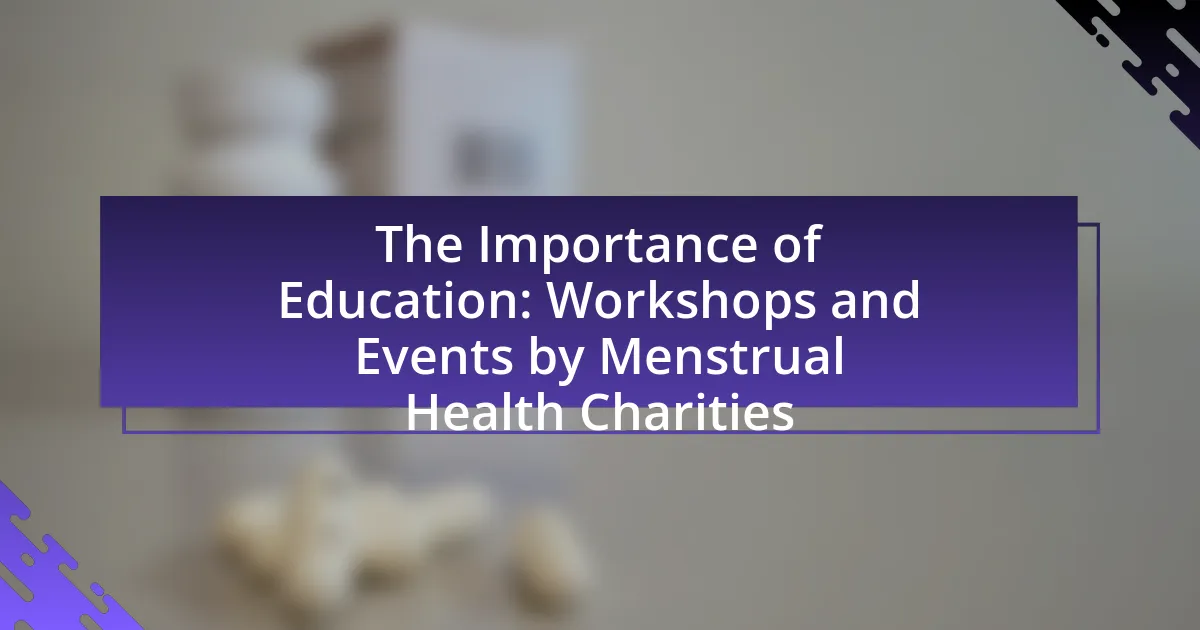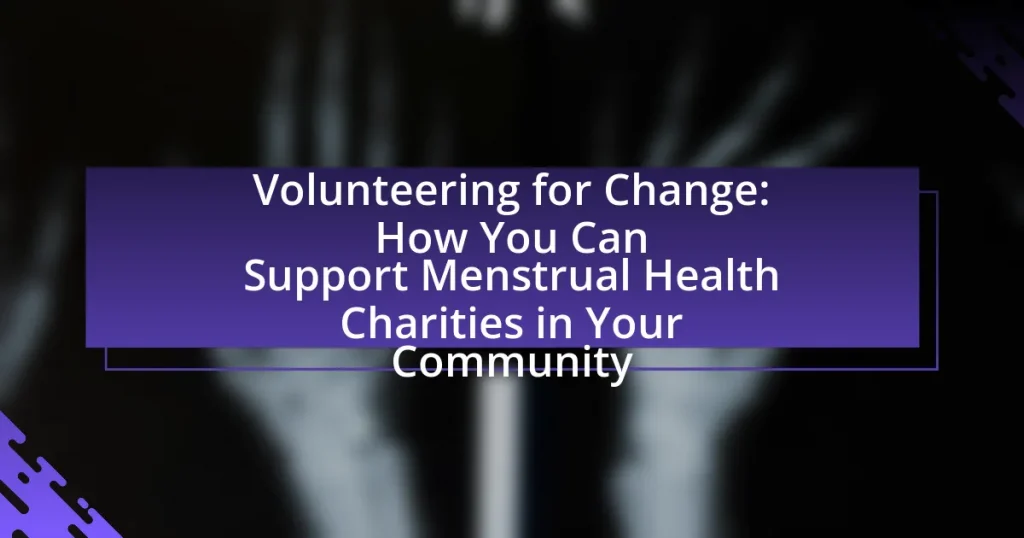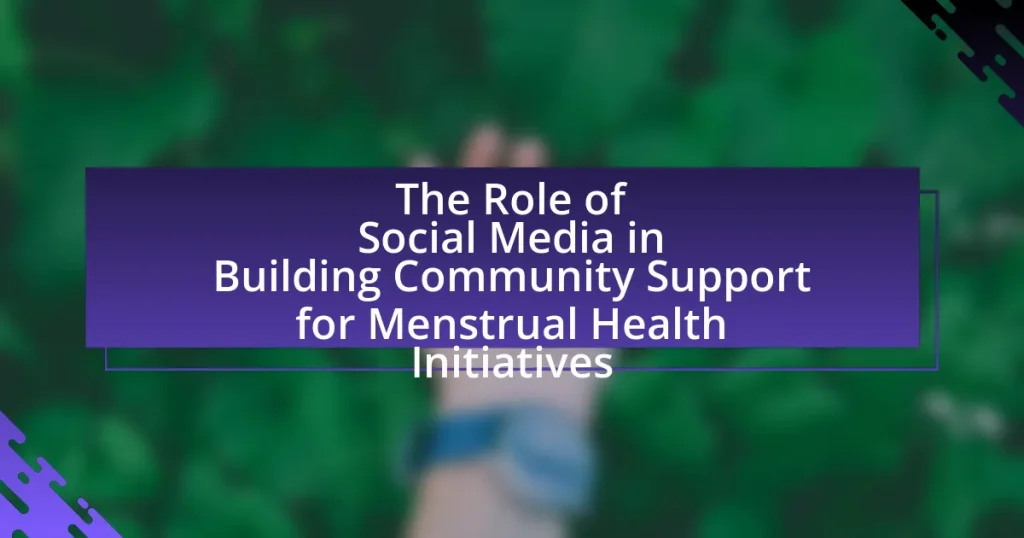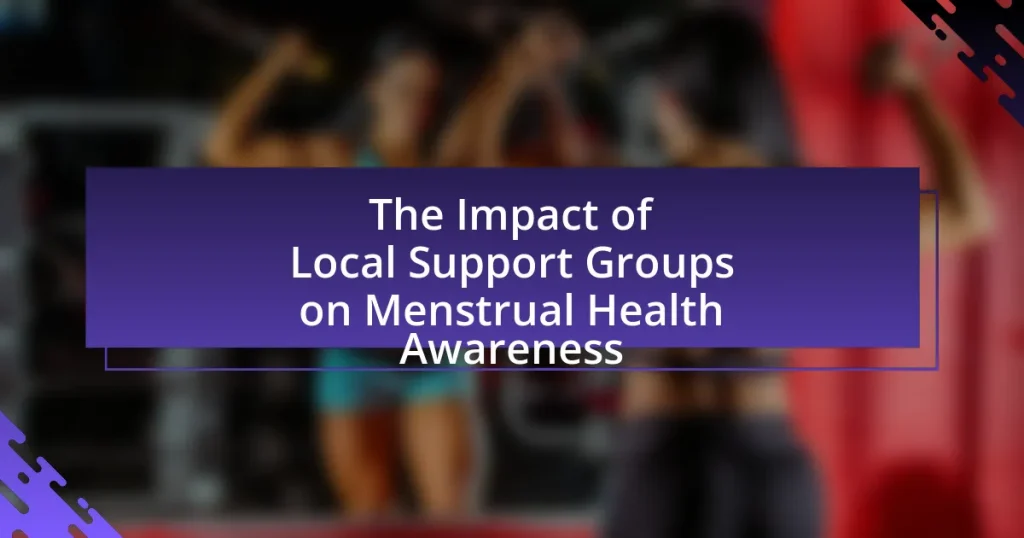The article focuses on the significance of education in menstrual health, particularly through workshops and events organized by menstrual health charities. It highlights how comprehensive education empowers individuals to manage menstrual hygiene, dispel myths, and reduce stigma, ultimately leading to improved health outcomes. Key objectives of menstrual health education include promoting awareness, providing accurate information, and fostering open discussions. The article also examines the role of misinformation, the impact of workshops on community health, and effective strategies for promoting menstrual health education initiatives.
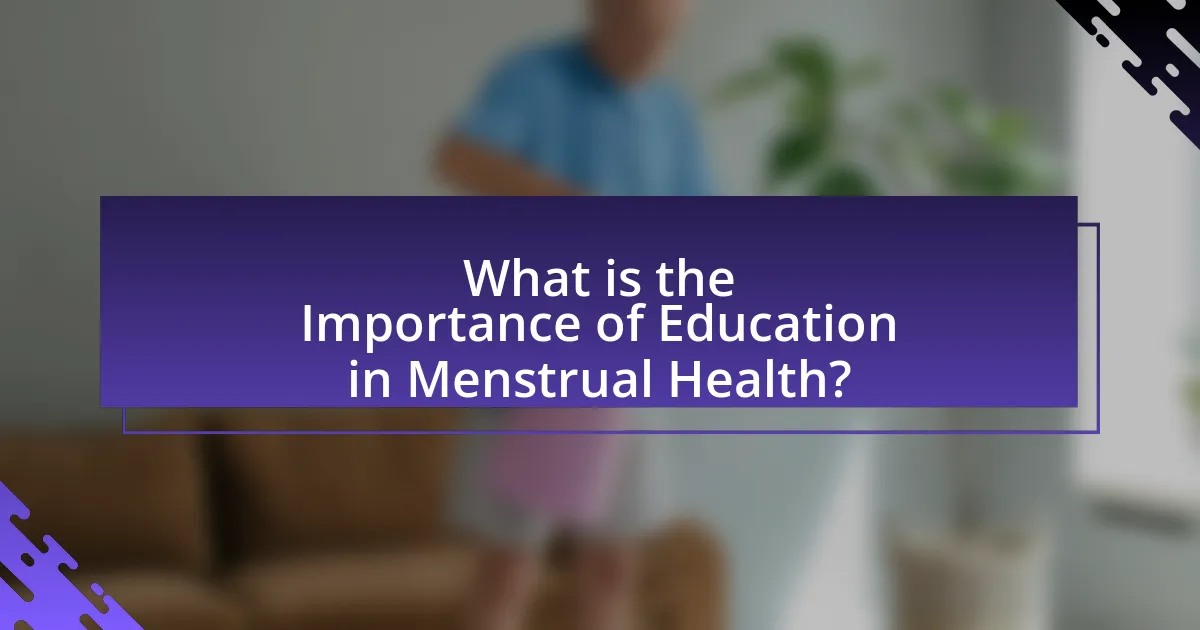
What is the Importance of Education in Menstrual Health?
Education in menstrual health is crucial for empowering individuals to manage their menstrual hygiene effectively and to understand the biological processes involved. Comprehensive education helps dispel myths and stigma surrounding menstruation, leading to improved health outcomes and increased confidence among menstruators. Studies indicate that informed individuals are more likely to practice proper hygiene, which can reduce the risk of infections and other health complications. For instance, a survey by the World Health Organization found that girls who received education on menstrual health were 1.5 times more likely to report using sanitary products consistently. Thus, education serves as a foundational element in promoting menstrual health and well-being.
Why is education crucial for menstrual health awareness?
Education is crucial for menstrual health awareness because it empowers individuals with knowledge about menstrual cycles, hygiene practices, and reproductive health. This understanding helps to dispel myths and stigma surrounding menstruation, leading to improved health outcomes. For instance, studies show that comprehensive menstrual health education can significantly reduce absenteeism in schools among menstruating individuals, as they feel more prepared and supported. Furthermore, informed individuals are more likely to seek medical help when needed, contributing to overall better health management.
How does education impact menstrual health outcomes?
Education significantly improves menstrual health outcomes by increasing awareness and understanding of menstrual hygiene management. Research indicates that educated individuals are more likely to access and utilize sanitary products, leading to better health practices during menstruation. For instance, a study published in the Journal of Adolescent Health found that girls who received education on menstrual health were 1.5 times more likely to use sanitary pads compared to those who did not receive such education. This increased usage correlates with reduced instances of reproductive health issues and improved overall well-being. Furthermore, education fosters open discussions about menstruation, reducing stigma and promoting supportive environments, which are crucial for maintaining menstrual health.
What role does misinformation play in menstrual health education?
Misinformation significantly undermines menstrual health education by perpetuating myths and misconceptions that can lead to harmful practices and stigma. For instance, false beliefs about menstruation, such as the idea that it is unclean or should be hidden, can discourage open discussions and proper hygiene practices. Research indicates that misinformation can lead to a lack of understanding about menstrual health, resulting in negative health outcomes; a study published in the Journal of Adolescent Health found that adolescents exposed to misinformation were less likely to seek medical advice regarding menstrual issues. Therefore, addressing misinformation is crucial for promoting accurate knowledge and fostering a supportive environment for menstrual health education.
What are the key objectives of menstrual health education?
The key objectives of menstrual health education are to promote awareness, reduce stigma, and provide accurate information about menstruation and reproductive health. This education aims to empower individuals, particularly young people, by equipping them with knowledge about menstrual cycles, hygiene practices, and the biological processes involved. Research indicates that comprehensive menstrual health education can lead to improved health outcomes, as evidenced by studies showing that informed individuals are more likely to manage their menstrual health effectively and seek medical help when necessary. Additionally, such education fosters open discussions, which can help dismantle cultural taboos surrounding menstruation, ultimately contributing to gender equality and improved overall well-being.
How do workshops contribute to achieving these objectives?
Workshops contribute to achieving educational objectives by providing interactive learning experiences that enhance knowledge and skills related to menstrual health. These sessions facilitate direct engagement, allowing participants to ask questions, share experiences, and receive tailored information, which is crucial for understanding complex topics. Research indicates that interactive workshops significantly improve retention of information compared to traditional lecture formats, as evidenced by a study published in the Journal of Educational Psychology, which found that active participation increases learning outcomes by up to 50%. Thus, workshops serve as effective platforms for menstrual health charities to disseminate vital information and empower individuals with the knowledge necessary for informed decision-making regarding their health.
What skills and knowledge should be imparted through education?
Education should impart critical thinking, emotional intelligence, and practical skills related to menstrual health. Critical thinking enables individuals to analyze information and make informed decisions regarding their health. Emotional intelligence fosters empathy and understanding, which are essential for discussing sensitive topics like menstruation. Practical skills include knowledge of menstrual hygiene management, reproductive health, and access to resources, which are vital for personal well-being and community health. These skills and knowledge are supported by studies indicating that comprehensive education on menstrual health leads to improved health outcomes and reduced stigma surrounding menstruation.
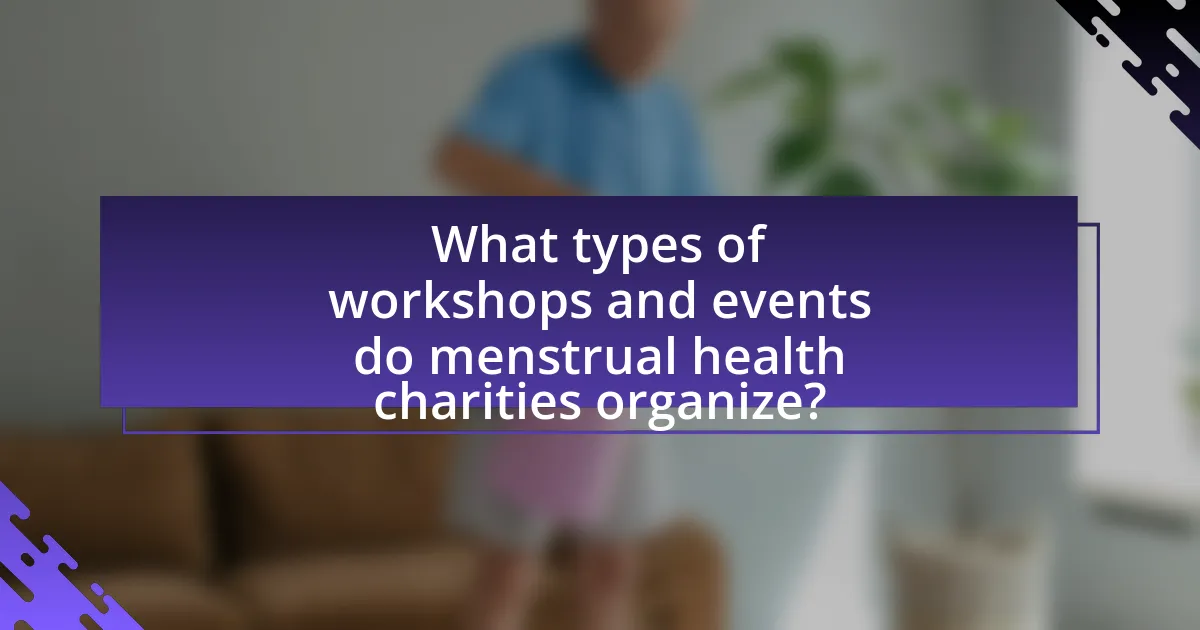
What types of workshops and events do menstrual health charities organize?
Menstrual health charities organize a variety of workshops and events focused on education, awareness, and empowerment regarding menstrual health. These include educational seminars that provide information on menstrual hygiene management, workshops that teach participants about reproductive health and rights, and community events aimed at reducing stigma surrounding menstruation. Additionally, some charities host advocacy training sessions to equip individuals with the skills needed to promote menstrual health policies. Evidence of the effectiveness of these initiatives can be seen in studies showing increased knowledge and reduced stigma among participants following such workshops.
How do these workshops differ in format and content?
Workshops by menstrual health charities differ in format and content primarily based on their target audience and educational objectives. For instance, some workshops are designed as interactive sessions that encourage participant engagement through discussions and activities, while others may follow a lecture format that focuses on delivering information from experts. Additionally, content varies significantly; some workshops may emphasize practical skills, such as menstrual product usage and hygiene management, whereas others might focus on broader topics like menstrual health education and advocacy. This distinction is supported by the varying needs of participants, as evidenced by feedback from attendees who express preferences for hands-on learning versus theoretical knowledge.
What are the most common topics covered in these workshops?
The most common topics covered in workshops by menstrual health charities include menstrual hygiene management, reproductive health education, and awareness of menstrual disorders. These workshops aim to educate participants on the importance of proper menstrual care, the biological aspects of menstruation, and the social stigma surrounding menstruation. Evidence from various studies indicates that such educational initiatives significantly improve knowledge and attitudes towards menstrual health, thereby promoting better health outcomes and reducing stigma.
Who are the target audiences for these events?
The target audiences for workshops and events organized by menstrual health charities include individuals experiencing menstruation, educators, healthcare professionals, and community leaders. These audiences are engaged to enhance awareness and understanding of menstrual health issues, promote education, and foster community support. Research indicates that educational initiatives aimed at these groups can significantly improve knowledge and reduce stigma surrounding menstruation, as evidenced by studies showing increased awareness among participants after attending such events.
What are the benefits of attending menstrual health workshops?
Attending menstrual health workshops provides individuals with essential knowledge about menstrual health, empowering them to make informed decisions regarding their bodies. These workshops often cover topics such as menstrual hygiene, reproductive health, and the management of menstrual disorders, which can lead to improved health outcomes. Research indicates that education on menstrual health can reduce stigma and misinformation, fostering a supportive community. For instance, a study published in the Journal of Adolescent Health found that comprehensive menstrual education significantly improved participants’ understanding and attitudes towards menstruation. This knowledge not only enhances personal health but also promotes advocacy for menstrual health issues within communities.
How do workshops empower individuals regarding their menstrual health?
Workshops empower individuals regarding their menstrual health by providing essential knowledge and skills that promote informed decision-making and self-advocacy. These educational sessions often cover topics such as menstrual cycle awareness, hygiene practices, and the management of menstrual disorders, which help participants understand their bodies better. Research indicates that comprehensive menstrual health education can lead to improved health outcomes, as evidenced by a study published in the Journal of Adolescent Health, which found that girls who received menstrual health education reported greater confidence in managing their menstrual health. By fostering a supportive environment for discussion and learning, workshops also reduce stigma and encourage open conversations about menstruation, ultimately empowering individuals to take control of their health.
What community impacts can result from these educational events?
Educational events organized by menstrual health charities can lead to significant community impacts, including increased awareness of menstrual health issues and improved health literacy among participants. These events often provide essential information that empowers individuals to manage their menstrual health effectively, thereby reducing stigma and fostering open discussions within the community. For instance, studies have shown that educational workshops can lead to a 30% increase in knowledge about menstrual hygiene practices among attendees, which directly correlates with better health outcomes. Additionally, these events can strengthen community bonds by encouraging collaboration and support networks, ultimately promoting a culture of health and well-being.
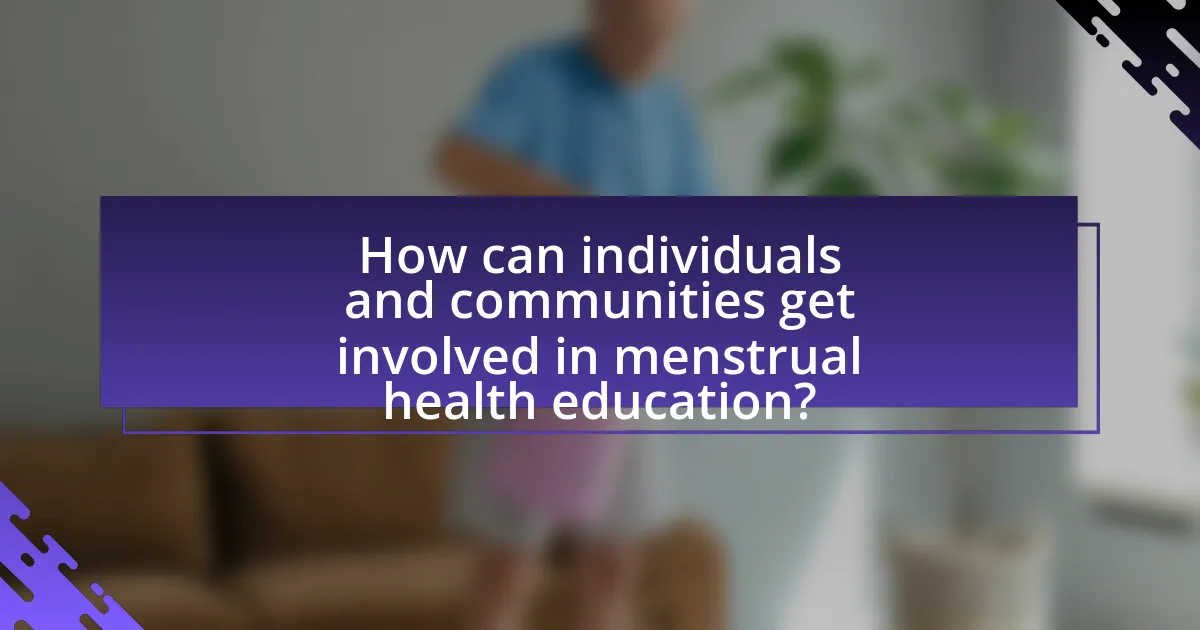
How can individuals and communities get involved in menstrual health education?
Individuals and communities can get involved in menstrual health education by participating in workshops and events organized by menstrual health charities. These organizations often provide training sessions that equip participants with knowledge about menstrual health, hygiene, and stigma reduction. For example, the Menstrual Health Hub reports that community-led workshops can increase awareness and understanding of menstrual health issues, leading to improved health outcomes. Additionally, individuals can volunteer to facilitate discussions or distribute educational materials, thereby fostering a supportive environment for open conversations about menstruation. Engaging in local advocacy efforts to promote menstrual health policies can also enhance community involvement and awareness.
What are some effective ways to promote menstrual health workshops?
Effective ways to promote menstrual health workshops include leveraging social media platforms, collaborating with influencers, and utilizing community partnerships. Social media platforms like Instagram and Facebook allow for targeted advertising and engagement with specific demographics, increasing visibility and attendance. Collaborating with influencers who advocate for menstrual health can amplify the message and reach a broader audience, as studies show that influencer marketing can increase engagement by up to 10 times. Additionally, partnering with local organizations, schools, and healthcare providers can facilitate outreach and provide credibility, as community-based initiatives often see higher participation rates.
How can social media be utilized to raise awareness?
Social media can be utilized to raise awareness by disseminating information quickly and engaging a broad audience. Platforms like Facebook, Twitter, and Instagram allow menstrual health charities to share educational content, personal stories, and impactful statistics that highlight the importance of menstrual health. For instance, a campaign by the charity Days for Girls reached over 1 million people through social media, effectively raising awareness about menstrual hygiene management. This demonstrates that social media serves as a powerful tool for amplifying messages and fostering community engagement around critical health issues.
What partnerships can enhance the reach of these workshops?
Collaborations with local schools, healthcare providers, and community organizations can significantly enhance the reach of workshops organized by menstrual health charities. Local schools can facilitate access to students and parents, while healthcare providers can offer credibility and resources, ensuring accurate information is disseminated. Community organizations often have established networks that can help promote the workshops to diverse populations, increasing participation rates. For instance, partnerships with organizations like Planned Parenthood have been shown to effectively broaden outreach efforts, as they already engage with communities on health education.
What best practices should be followed when organizing menstrual health events?
To effectively organize menstrual health events, it is essential to prioritize inclusivity, education, and community engagement. Inclusivity ensures that diverse voices and experiences are represented, which can be achieved by inviting speakers from various backgrounds and tailoring content to different audiences. Education should focus on accurate, evidence-based information about menstrual health, utilizing resources from reputable organizations like the World Health Organization. Community engagement can be fostered through partnerships with local health providers and schools, enhancing outreach and participation. These practices are supported by studies indicating that inclusive and educational approaches significantly improve awareness and reduce stigma surrounding menstrual health.
How can facilitators ensure inclusivity and accessibility in workshops?
Facilitators can ensure inclusivity and accessibility in workshops by implementing diverse teaching methods and providing necessary accommodations. This includes using visual aids, offering materials in multiple formats, and ensuring physical spaces are accessible to individuals with disabilities. Research indicates that inclusive practices, such as providing sign language interpreters and ensuring gender-neutral language, enhance participation and engagement among all attendees. For example, a study by the National Center on Disability and Access to Education found that inclusive educational environments significantly improve learning outcomes for participants with diverse needs.
What resources are essential for successful event planning?
Successful event planning requires a combination of human resources, financial resources, and logistical resources. Human resources include a skilled team of planners, volunteers, and vendors who can execute various tasks effectively. Financial resources encompass a budget that covers venue costs, catering, marketing, and materials necessary for the event. Logistical resources involve the tools and technology needed for event management, such as registration systems, communication platforms, and equipment for presentations. These resources collectively ensure that events run smoothly and achieve their intended goals, as evidenced by successful workshops and events organized by menstrual health charities that rely on these essential components for effective outreach and education.
What are some practical tips for individuals interested in menstrual health education?
Individuals interested in menstrual health education should actively seek out reliable resources, such as reputable websites, books, and academic journals focused on menstrual health. Engaging in workshops and events organized by menstrual health charities can provide firsthand knowledge and community support. Participating in discussions and forums can enhance understanding and awareness of menstrual health issues. Additionally, staying informed about current research and developments in menstrual health can empower individuals to share accurate information. For instance, studies show that comprehensive menstrual health education can significantly improve knowledge and attitudes towards menstruation, as highlighted in the research by the World Health Organization.
